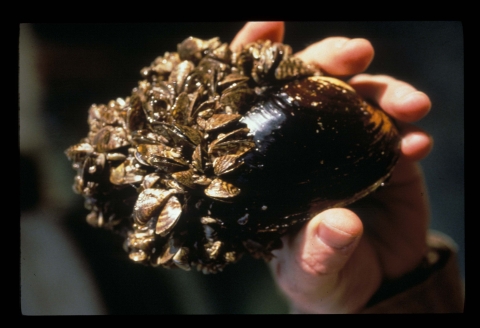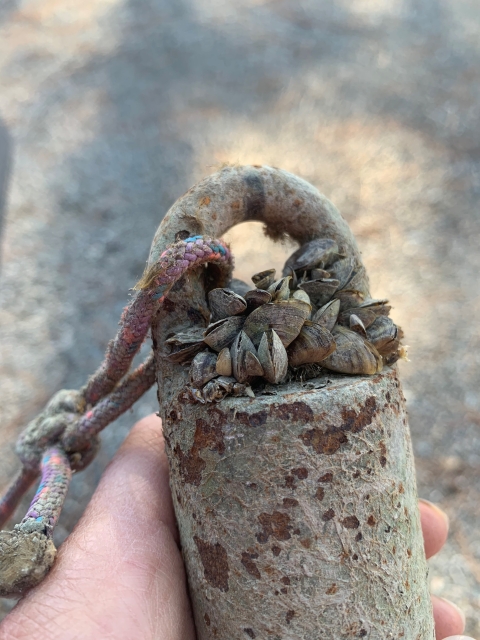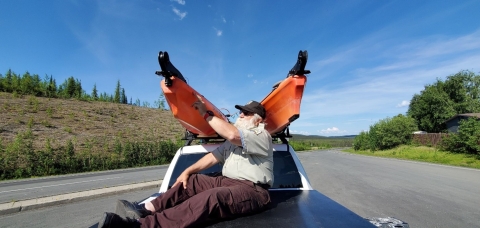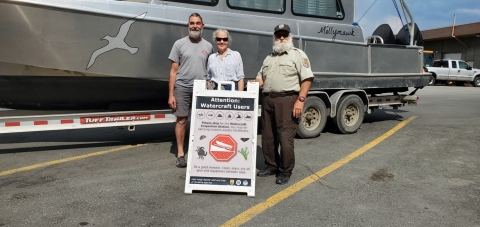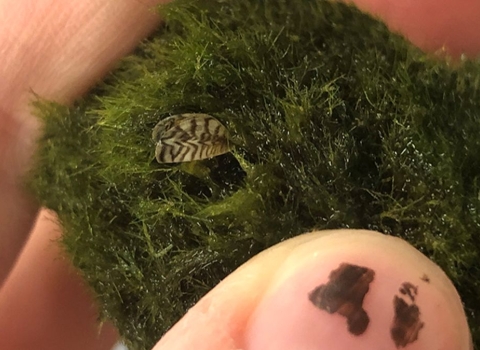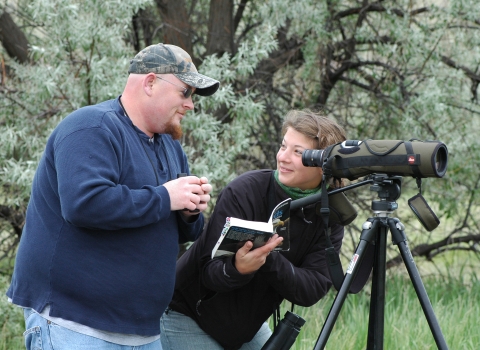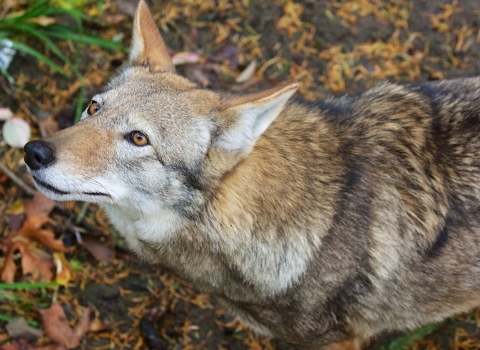Zebra and quagga mussels, collectively known as dreissenid mussels, are major freshwater invasive species invasive species
An invasive species is any plant or animal that has spread or been introduced into a new area where they are, or could, cause harm to the environment, economy, or human, animal, or plant health. Their unwelcome presence can destroy ecosystems and cost millions of dollars.
Learn more about invasive species of concern. Native to Europe, dreissenid mussels were introduced to the United States via discharge of ballast water in the 1980s. These freshwater mussels dramatically alter ecosystems, quickly forming dense colonies once established. They filter feed and attach to a wide range of surfaces, including rocks, cement, ropes, docks, boats, aquatic plants, and other mussels.
Since their initial introduction into the Great Lakes region, dreissenid mussels have been hitchhiking into waterbodies across the US and Canada. To prevent spread, a network of watercraft inspection and decontamination (WID) stations have been established involving state, federal, provincial, and tribal agencies.
Thanks in part to inspectors from U.S. Fish and Wildlife Service, Alaska is only one of five western states not infested with invasive dreissenid mussels!
The U.S. Fish and Wildlife Service (USFWS) operates the only WID station in Alaska. USFWS staff offer inspections at the Alaska-Canada Highway (Alcan) Land Port of Entry (LPOE), the primary land access point to Alaska. With support from US Customs and Border Protection and Alaska Department of Fish and Game, USFWS employees inspect watercraft at Alcan LPOE from May through August following procedures developed by the Aquatic Nuisance Species Task Force’s Western Regional Panel.
How to stop aquatic hitchhikers: start with a quick courtesy boat inspection!
Inspections consist of physically inspecting the watercraft and collecting information about the watercraft’s history. When and where did you last have the boat in the water? Have you stopped at another WID? Where are you planning on boating next? Based on the answers and physical inspection, inspectors assign a potential risk level for aquatic invasive species (e.g., zebra or quagga mussels, aquatic plants) to the watercraft.
High risk factors include complex watercraft (think lots of compartments for mussels to hitch a ride), operation in waterbody known to be infested with dreissenid mussels (duh!), and presence of standing water (think livewells, engine compartments, etc). Unlike adult mussels, veligers, the larval stage of dreissenid mussels, are free floating in water and cannot be seen with the naked eye. Unknowing they can be transported from one waterbody to another via standing water, potentially infesting a new waterbody.
If a watercraft or associated gear is found to be high risk, has any standing water, or infested with any aquatic invasive species, inspectors use a portable decontamination unit. The high pressure, high temperature (140F) pressure washer is designed to destroy any potential aquatic invasive species. It is equipped to decontaminate both the watercraft’s internal compartments and engines, as well as the external portion of the watercraft.
Prevention and early detection are the most effective methods of managing invasive species.
The WID station at the Alcan LPOE serves as the first line of defense for the majority of watercraft coming into the state. Since the first full operation period in 2021, inspectors have examined hundreds of watercrafts coming into Alaska each season. Thankfully, many of these watercrafts have been relatively low risk (e.g., previously inspected enroute to Alaska, launched in non-AIS positive waterbodies, given adequate time to dry between launches). Despite this, the stakes are high and the importance of the WID station remains fully evident.
In 2022, a zebra mussel-infested watercraft arrived at the Alcan LPOE. Inspectors found the hull and underside of the engine encrusted in dried zebra mussels. Cue, Gandalf voice “you shall not pass”. The inspectors performed a full decontamination of the watercraft to remove any and all attached mussels before the owners happily continued their Alaskan journey. Plus, the owners learned about zebra mussels and their devastating environmental impacts.
In 2024, a watercraft containing standing water of unknown origins arrived. Alarm bells went off in the inspectors’ heads with the thought of potential veligers hitchhiking in the water. Again, the inspectors performed a full decontamination to remove any potential threat before sending the owners along their Alaskan adventure.
Just as Gandalf famously declared 'You shall not pass!' to protect the passageway from great evil in Lord of the Rings, we must continue a similar attitude in our prevention of zebra mussels.
These tiny, invasive mussels pose a serious threat to our waterways, ecosystems, and infrastructure.
By thoroughly cleaning, draining, and drying all boats and equipment, we are setting up a barrier to their spread. This rigorous approach ensures that zebra mussels 'shall not pass' into our lakes and rivers, preserving the health and balance of our aquatic ecosystems. Each of us plays a crucial role in this effort—through careful inspection, cleaning, and public awareness, we can collectively prevent these invasive species from making their way into new waters.
Remember—you can be part of the solution to prevent the potential spread of aquatic invasive species. Clean. Drain. Dry.
CLEAN off all plants, animals, mud, and debris from watercrafts and equipment before leaving waterbody.
DRAIN all water from watercrafts, livewells, motors, and equipment before leaving waterbody.
DRY everything in the sun for at least 5 days or wipe with towels before entering a new waterbody.
Thank an inspector when you see one, and maybe even pose for a picture!
____________
The logistical operation of the Alcan LPOE WID station would not be possible without the cooperation from federal agencies and offices. Notably, US Customs and Border Protection, USFWS Office of Law Enforcement, and Tetlin National Wildlife Refuge provide inspectors with inspection support, office space, ensure compliance from watercraft owners, and ensure safety of inspectors on and off the clock.


